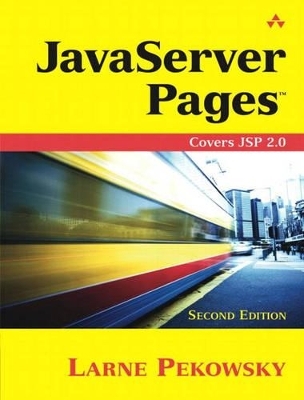
JavaServer Pages
Addison-Wesley Educational Publishers Inc
978-0-321-15079-0 (ISBN)
- Titel ist leider vergriffen;
keine Neuauflage - Artikel merken
This book teaches beginner programmers how to create dynamic web sites with JavaServer Pages (JSP) using many examples. This tutorial/reference brings JavaServer Pages to the huge audience of non-programmers and allows them to get the most productivity from JSPs, with the least effort. This second edition covers the latest release of the JSP specification (2.0), including overviews of some related technologies such as servlets, the Java standard tag library (JSTL), Jakarta Struts, and databases. The second edition of this bestseller includes a number of standard extensions to JSPs, as well as a number of best practices that have been developed since the first edition was written.Over the past few years, JavaServer Pages have become a popular and important technology for building dynamic web sites. Several commercial implementations, as well as wide-spread open-source ones, already exist and are in wide use. Unlike Microsoft's Active Server Pages, JSPs do not tie the developer to any particular platform, and are available to developers at no cost.
Larne Pekowsky is the former vice president of engineering and chief software architect at CapitalThinking, where he led development with open source technologies. He is the coauthor of The Developer's Guide to the Java™ Web Server™ (Addison-Wesley, 1999) and the author of JavaServer Pages, Second Edition (Addison-Wesley, 2004) and is currently pursuing a degree in physics at Stony Brook University.
Preface.
Acknowledgments.
1. Introduction.
A Brief History of the Web.
Basic Dynamic Page Generation.
Solving CGI Problems.
Speeding up CGI.
Separating HTML from Code.
Servlets and JavaServer Pages.
Welcome to Java News Today.
Trying the Examples.
2. Simple JSPs.
Removing Text from a JSP.
JSP Errors.
Including Text in a JSP.
The Phases of a JSP.
Creating Custom Error Pages.
Java News Today.
Summary and Conclusions.
Tags Learned in This Chapter.
3. Using Beans.
Splitting Big Tasks into Manageable Pieces.
Defining Beans.
JavaBean Tags.
Getting a Property.
Setting Properties.
Making Data Available Throughout an Application.
The Page Scope.
The Request Scope.
The Session Scope.
The Application Scope.
Special Actions When Beans Are Created.
Making Beans Last Forever.
Java News Today and Beans.
Future Directions.
Summary and Conclusions.
Tags Learned in This Chapter.
4. The Standard Tag Library.
Tag Libraries.
Tags with Bodies.
Dynamic Attributes in Tags.
Displaying Expressions.
Formatting Output.
Compound Data in the Expression Language.
Repeating a Section of a Page.
Optionally Including Sections of a Page.
Browser Detection.
Combining Tags.
Selecting among Multiple Choices.
Summary and Conclusions.
Tags Learned in this Chapter.
5. Java News Today: Part I.
The Beans.
The Header.
The Left-Hand Navigation.
The Login Page.
The Quiz Result Page.
The Section Page.
The Article Page.
The Remaining Pages.
Summary and Conclusions.
Tags Learned in this Chapter.
6. Databases.
A Quick Introduction to Databases.
A Language for Databases.
Using SQL Directly from JSPs.
Inserting Data from JSPs.
SQL and Beans.
Summary and Conclusions.
Tags Learned in This Chapter.
7. Java News Today: Part 2.
Designing the Tables.
Adding Articles.
User Pages.
Other User Preferences.
Advertising.
Summary and Conclusions.
8. Working with XML.
A Brief Introduction to XML.
Using XML in JSPs.
Selecting Data from an XML Document.
Processing XML in JSPs.
Formatting XML.
Java News Today and XML.
Summary and Conclusions.
Tags Learned in this Chapter.
9. A Small Cup of Java.
Expressions.
Types.
Storing Values.
Method Calls.
Conditionally Evaluating Code.
Evaluating the Same Code Multiple Times.
Grouping Code.
Handling Errors.
Modeling a Problem with Objects.
Objects in Java.
Building Objects from Classes.
Sometimes Nothing Is Something.
Building Classes from Other Classes.
Interfaces.
Creating Groups of Classes and Interfaces.
Using Java in JSPs.
Database Access from Java.
Summary and Conclusions.
10. Writing Beans.
How Beans Are Implemented.
Automatic Type Conversion.
How Beans Work.
Bean Serialization.
Events.
Special Events.
Bean Errors.
Summary and Conclusions.
11. Servlets.
The Servlet Life Cycle.
The Servlet Class Hierarchy.
More about Requests.
More about Responses.
Convenience Methods.
Servlet Events.
Forwarding and Including Requests.
Using Scopes from Servlets.
Using Beans from Servlets.
The JSP Classes.
Intercepting Requests.
Summary and Conclusions.
12. The Controller.
Some Common Controller Tasks.
Support for Controllers: Struts.
Using Struts.
Providing Security.
Struts and JNT.
Summary and Conclusions.
13. Creating New Tag Libraries.
The Tag Life Cycle.
Tags without Bodies.
Tags with Bodies.
Using the Expression Language.
JSPs as Custom Tags.
Summary and Conclusions.
14. Advanced Topics.
Declaring Variables and Methods.
Extending Different Classes.
Returning Other Kinds of Data.
Threads.
Avoiding Thread Problems.
Using Threads.
Advanced Error Handling.
Summary and Conclusions.
Appendix A. Summary of Tags.
Built-in Tags.
Core Tags.
Format, Parsing, and Internationalization Tags.
SQL Tags.
XML Tags.
Appendix B. Configuring a Web Application.
Layout of the Directories.
The Web.xml File.
Index. 0321150791T08282003
| Erscheint lt. Verlag | 4.9.2003 |
|---|---|
| Verlagsort | New Jersey |
| Sprache | englisch |
| Maße | 178 x 235 mm |
| Gewicht | 723 g |
| Themenwelt | Mathematik / Informatik ► Informatik ► Web / Internet |
| ISBN-10 | 0-321-15079-1 / 0321150791 |
| ISBN-13 | 978-0-321-15079-0 / 9780321150790 |
| Zustand | Neuware |
| Haben Sie eine Frage zum Produkt? |
aus dem Bereich
